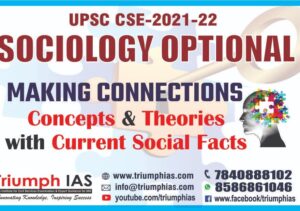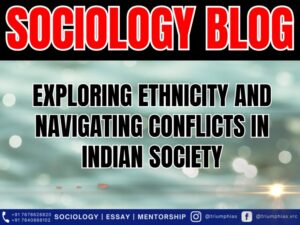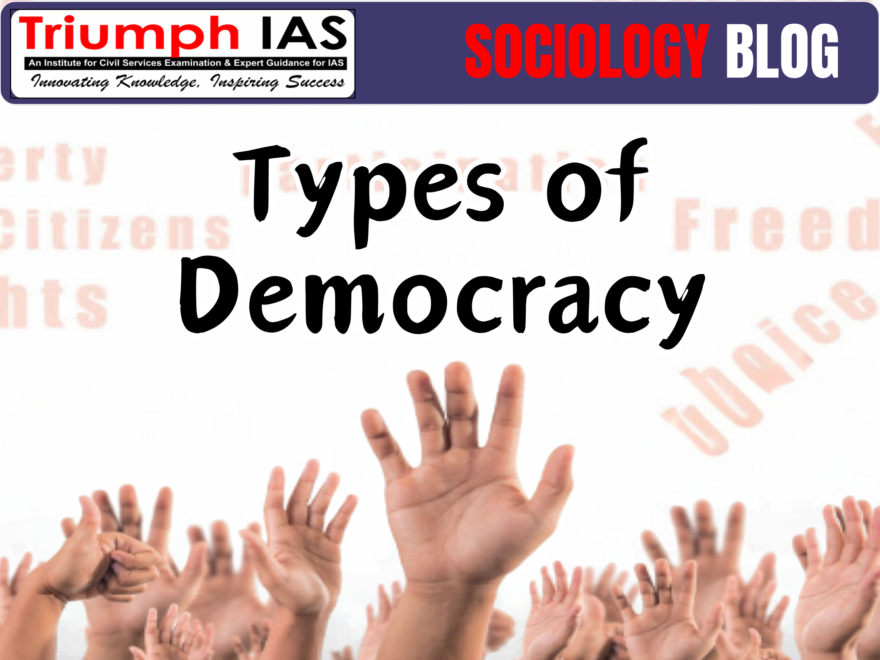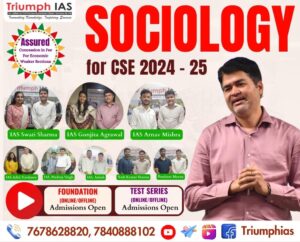Types of democracy
Relevant for Sociology Optional for Civil Service Examination.
Sociology Paper -2
Unit 3 : Social Change in India : Politics and Society
Types of democracy
- Classical Democracy: Classical Democracy, rooted in the polis or city-state of Ancient Greece, operated on a distinctive system of governance that emerged in the most prominent Greek city-state through mass meetings. Noteworthy in this model was the high political engagement of citizens, who actively participated in Assembly meetings, decision-making processes, and public offices. However, the downside was the exclusion of women, slaves, and foreigners from citizenship. The exclusion of these groups, though unfortunate and undemocratic, allowed male Athenian citizens the freedom to engage in political affairs. Plato criticized Athenian democracy in “The Republic,” contending that people lacked the capacity to rule themselves wisely and advocated for rule by philosopher kings and guardians.
- Elitist Democracy: Vilfredo Pareto, G. Mosca, Robert Michels, and Joseph Schumpeter proposed the theory of elitist democracy, primarily developed in sociology with significant implications for political science. Michels introduced the “iron law of oligarchy,” asserting that every organization, despite its initial goals, ultimately succumbs to oligarchy—a rule by a few. Mosca categorized people into rulers and the ruled, positing that power, prestige, and wealth predominantly lie in the hands of the ruling class, regardless of the form of government. This theory raises doubts about the feasibility of democracy, suggesting that elites would control power, wealth, and decision-making.
- Pluralist Democracy: In contrast to elitist theory, pluralists argue that policy-making is a decentralized process where various groups negotiate for the acceptance of their views. Unlike the concentration of power in a few elites, public policy formation results from interactions among diverse groups. Dahl and Lindblom introduced the concept of “polyarchy,” signifying rule by many instead of rule by all citizens. They concluded that while the politically privileged and economically powerful wield more influence than ordinary citizens, no elite can permanently dominate the political process.
- Participatory Democracy: While all democracies involve some level of participation based on popular consent, participatory democracy goes beyond mere voting. In complex democracies with diverse populations, there is a risk of citizens’ roles being limited to voting. Participatory democracy advocates for active citizen involvement in policymaking, aiming to promote the common good and enhance government accountability. Advocates of participatory democracy include Jean J. Rousseau, J. S. Mill, and C. B. Macpherson, who argue for popular sovereignty and active citizen engagement in state affairs.
- Deliberative Democracy: Deliberative democracy posits that political decisions should arise from fair and reasonable deliberations among citizens, emphasizing the quality of the process for optimal outcomes. Advocates such as John Rawls and Jurgen Habermas argue that reasoned discourse can overcome self-interest to achieve a just political society. Habermas specifically emphasizes fair procedures and clear communication leading to legitimate and mutually agreed-upon decisions.
- People’s Democracy: People’s democracy, rooted in the Marxist tradition, presents democratic models distinct from Western ideals. Marxists focus on social equality, and people’s democracy emerges after the proletarian revolution when the proletariat begins making political decisions. Karl Marx initially spoke of the rule of the proletariat, while Lenin introduced the role of the party as the vanguard. However, Lenin failed to establish mechanisms to check the party’s power and ensure accountability to the proletariat.
- Social Democracy: Social democracy represents a departure from Marxist thought, aiming to achieve socialist goals through state regulation rather than revolution. Social democrats reject the Marxist critique of democracy as a “bourgeois facade for class rule” and see democracy as crucial for realizing socialist ideals. The movement originated with August Bebel and Wilhelm Liebknecht, co-founders of the Social Democratic Workers’ Party in Germany in 1869.
- E-Democracy: A relatively recent concept, e-democracy, or electronic democracy, builds on earlier theorists’ ideas and leverages information and technology to enhance or replace representative democracy. Addressing common issues in democracies, such as scale, lack of time, declining community values, and limited opportunities for policy deliberation, e-democracy seeks to use digital communication to facilitate active citizen participation in policymaking.
Reference: Static Portion
Related Blogs…
 |
 |
Frequently Asked Questions:
1. Question: Define the term “ethnic movement” and provide an example from India.
Answer: An ethnic movement refers to a collective effort by a group sharing common cultural, linguistic, or religious traits, seeking to assert their identity and rights; an example from India is the Khalistan Movement in Punjab.
2. Question: Identify the main objectives behind the Gorkhaland ethnic movement.
Answer: The Gorkhaland ethnic movement primarily seeks to establish a separate state for India’s Nepali-speaking population in the Darjeeling region, advocating for linguistic and cultural recognition and political autonomy.
3. Question: What was the Operation Blue Star, and which ethnic movement was it related to?
Answer: Operation Blue Star was a military action in 1984, aiming to remove Sikh militants hiding in the Golden Temple in Amritsar; it is related to the Khalistan movement, which sought a separate Sikh country.
4. Question: Mention a critical factor that triggered the emergence of ethnic movements in India, as discussed by Dipankar Gupta.
Answer: Dipankar Gupta emphasized that ethnicity is fundamentally a political process, wherein caste and religion, the key components of identity formation, are politicized by leaders for vested interests.
5. Question: What were the primary reasons for the Assam Ethnicity conflicts involving Bodo tribals and Bengali Muslim settlers?
Answer: The Assam Ethnicity conflicts primarily stemmed from issues related to immigration, land rights, and resource allocation, leading to clashes, riots, and evolving relationships among indigenous communities to address challenges.
6. Question: Briefly describe the role of the Dravidian Movement in terms of caste and societal structure.
Answer: The Dravidian Movement, led notably by E.V. Ramasamy, aimed to establish an egalitarian society, focusing on anti-Brahmanism and advocating for equal rights for backward castes, while also introducing reforms like self-respect marriages.
7. Question: Name the prominent ethnic movements in North-East India and specify one common objective.
Answer: Prominent ethnic movements in North-East India include the Nagas’ and Mizos’ struggles; a common objective was to gain autonomy and recognition for their distinct tribal identities and cultural uniqueness.
8. Question: What is the key argument of Gail Omveldt regarding traditional Indian society and multiculturalism?
Answer: Gail Omveldt opposed romanticizing traditional Indian society, arguing that hierarchy has always dominated it and dismissing the notion that multiculturalism is an intrinsic feature of Indian society as a myth.
9. Question: Briefly explain the social hierarchy factor as a contributing element to ethnic movements as suggested by Olzak.
Answer: Olzak suggests that the construction of hierarchies among ethnic communities, which often leads to the suppression of one group by another, is a key factor that can instigate social and ethnic movements.
10. Question: Identify one consequence of the unequal economic development factor within the context of ethnic movements in India.
Answer: One consequence of unequal economic development is the marginalization and underdevelopment of certain groups, leading to feelings of alienation and sometimes initiating ethnic movements as these groups strive for equality and recognition.
GS Related Practices Questions…
To master these intricacies and fare well in the Sociology Optional Syllabus, aspiring sociologists might benefit from guidance by the Best Sociology Optional Teacher and participation in the Best Sociology Optional Coaching. These avenues provide comprehensive assistance, ensuring a solid understanding of sociology’s diverse methodologies and techniques.
META TAGS:
Ethnic Movements, ethnic movements in india, ethnic movement in sociology, Punjab Movement, North-East Ethnic Movements, Gorkhaland Movement, Dravidian Movement, Assam Ethnicity, Ethnic Conflicts, Sociopolitical Impact, India, Ethnic Consciousness, Ethnic Rights, Political Crisis, Economic Development, Cultural Disparities, Khalistan Movement, Nagaland, Mizoram, Multiculturalism, Political Economy, Identity Formation, Social Hierarchies, Bodo Tribals, Bengali Muslim Settlers, Anti-Sikh Riots, Operation Blue Star, Unequal Development, Ethnic Violence, Political Mobilization

Why Vikash Ranjan’s Classes for Sociology?
Proper guidance and assistance are required to learn the skill of interlinking current happenings with the conventional topics. VIKASH RANJAN SIR at TRIUMPH IAS guides students according to the Recent Trends of UPSC, making him the Best Sociology Teacher for Sociology Optional UPSC.
At Triumph IAS, the Best Sociology Optional Coaching platform, we not only provide the best study material and applied classes for Sociology for IAS but also conduct regular assignments and class tests to assess candidates’ writing skills and understanding of the subject.
Choose The Best Sociology Optional Teacher for IAS Preparation?
At the beginning of the journey for Civil Services Examination preparation, many students face a pivotal decision – selecting their optional subject. Questions such as “which optional subject is the best?” and “which optional subject is the most scoring?” frequently come to mind. Choosing the right optional subject, like choosing the best sociology optional teacher, is a subjective yet vital step that requires a thoughtful decision based on facts. A misstep in this crucial decision can indeed prove disastrous.
Ever since the exam pattern was revamped in 2013, the UPSC has eliminated the need for a second optional subject. Now, candidates have to choose only one optional subject for the UPSC Mains, which has two papers of 250 marks each. One of the compelling choices for many has been the sociology optional. However, it’s strongly advised to decide on your optional subject for mains well ahead of time to get sufficient time to complete the syllabus. After all, most students score similarly in General Studies Papers; it’s the score in the optional subject & essay that contributes significantly to the final selection.
“A sound strategy does not rely solely on the popular
Opinion of toppers or famous YouTubers cum teachers.”
It requires understanding one’s ability, interest, and the relevance of the subject, not just for the exam but also for life in general. Hence, when selecting the best sociology teacher, one must consider the usefulness of sociology optional coaching in General Studies, Essay, and Personality Test.
The choice of the optional subject should be based on objective criteria, such as the nature, scope, and size of the syllabus, uniformity and stability in the question pattern, relevance of the syllabic content in daily life in society, and the availability of study material and guidance. For example, choosing the best sociology optional coaching can ensure access to top-quality study materials and experienced teachers. Always remember, the approach of the UPSC optional subject differs from your academic studies of subjects. Therefore, before settling for sociology optional, you need to analyze the syllabus, previous years’ pattern, subject requirements (be it ideal, visionary, numerical, conceptual theoretical), and your comfort level with the subject.
This decision marks a critical point in your UPSC – CSE journey, potentially determining your success in a career in IAS/Civil Services. Therefore, it’s crucial to choose wisely, whether it’s the optional subject or the best sociology optional teacher. Always base your decision on accurate facts, and never let your emotional biases guide your choices. After all, the search for the best sociology optional coaching is about finding the perfect fit for your unique academic needs and aspirations.
To master these intricacies and fare well in the Sociology Optional Syllabus, aspiring sociologists might benefit from guidance by the Best Sociology Optional Teacher and participation in the Best Sociology Optional Coaching. These avenues provide comprehensive assistance, ensuring a solid understanding of sociology’s diverse methodologies and techniques. Sociology, Social theory, Best Sociology Optional Teacher, Best Sociology Optional Coaching, Sociology Optional Syllabus.
Best Sociology Optional Teacher, Sociology Syllabus, Sociology Optional, Sociology Optional Coaching, Best Sociology Optional Coaching, Best Sociology Teacher, Sociology Course, Sociology Teacher, Sociology Foundation, Sociology Foundation Course, Sociology Optional UPSC, Sociology for IAS,
Follow us :



Find More Blogs…
| Compare and contrast Karl Marx’s and Max weber’s | Karl Marx- Historical Materialism |
| Talcott Parsons : Social system | Scope of the subject and comparison with other social sciences |
KEYWORD: Types of democracy, Types of democracy, Types of democracy, Types of democracy, Types of democracy, Types of democracy, Types of democracy, Types of democracy, Types of democracy Types of democracy, Types of democracy, Types of democracy, Types of democracy, Types of democracy, Types of democracy, Types of democracy Types of democracy, Types of democracy, Types of democracy, Types of democracy, Types of democracy, Types of democracy, Types of democracy


